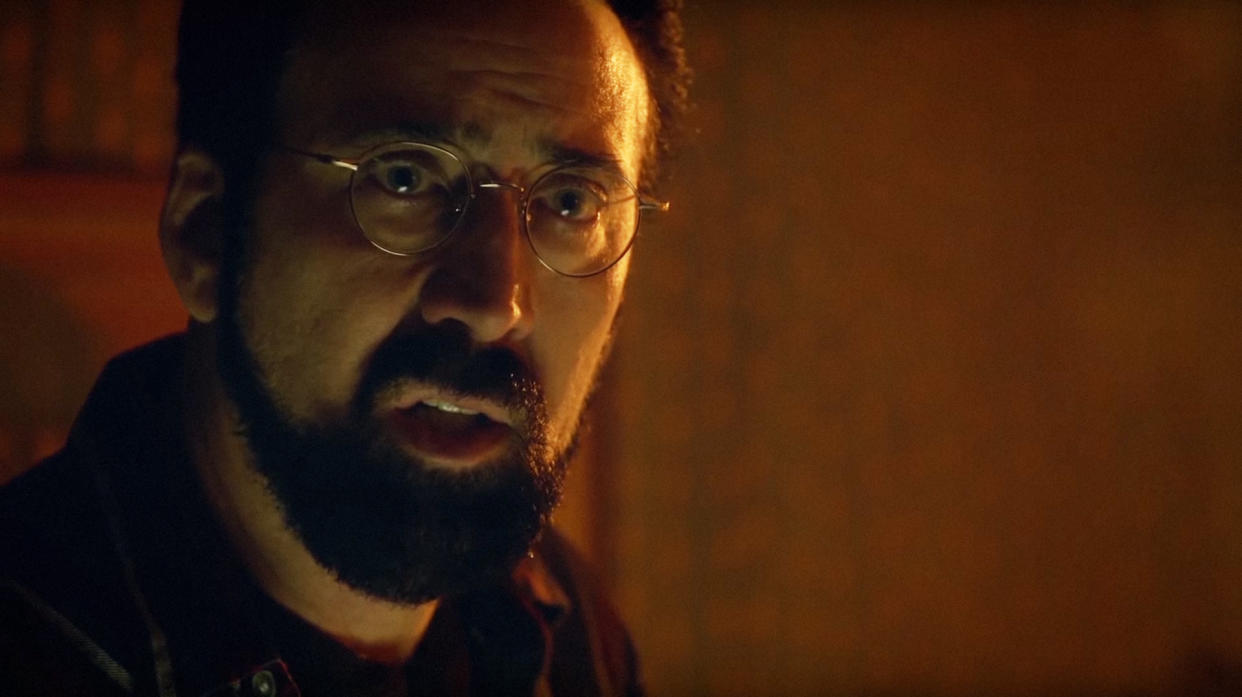Nicolas Cage is fairly certain social media would make him 'very paranoid'

Nicolas Cage doesn’t have to have an Internet presence to be a major presence on the Internet. The famously eccentric actor was one of the earliest online celebrity memes, and remains a subject of intense fascination in even the most far-flung corners of the World Wide Web, much to his amusement. “I’m aware of that phenomenon,” he told Yahoo Entertainment in 2016. “I have no explanation for it… [but] I’m going to go with viewing it as a positive thing; it keeps the work alive and people interested, and there’s something to be said for having an impact in a new kind of cultural world.”
It’s a world that Cage himself has zero interest in exploring, though. When we caught up with the Oscar winner recently to discuss his new psychological drama, Looking Glass, he emphasized that he’s happy to remain an analog guy in a digital world. “I made a specific decision not to become part of that club, because I’m old-school,” Cage says, adding that he always aspired to cultivate the same “enigmatic aura” as vintage movie stars like Humphrey Bogart, whose gravel voice he imitated to memorable effect in Paul Schrader’s 2016 film Dog Eat Dog. “You always wondered about them, because they weren’t that accessible. I know that’s antithetical to what most people believe today. I feel like most young actors today want to have a Twitter account and followers, and that’s part of the profile — part of the way they get their name in the paper. I’ve just always been anti that.”
One of the other side effects of social media is that it transforms users into voyeurs, peering into other people’s lives through their Facebook status updates and Instagram snapshots. And voyeurism is the subject at the center of Looking Glass, which unfolds at a desert motel recently purchased by married couple Ray and Maggie (Cage and Robin Tunney). Exploring his property one night, Ray discovers that one of the rooms comes tricked out with a two-way mirror, allowing him to observe the illicit activities his guests engage in when they’re (supposedly) alone.

Cage says that he’s long been fascinated by the subject of voyeurism, and directly connects it to the act of being in, or even simply watching, a movie. “There’s something about it that photographs well,” he explains, pointing to Peeping Tom and Rear Window as two classic examples of voyeuristic cinema. “It’s almost like we’re being voyeurs watching the movie: We’re watching someone who is watching someone else onscreen, so it almost becomes kind of Cubist.”
Over the course of Looking Glass, Ray evolves from being a casual peeping Tom into a full-blown obsessive. That loss of self-control may be another reason why Cage is adamant about staying off social media lest he risk becoming a digital voyeur. “I don’t go on Facebook, and I don’t have an Instagram or Twitter account. I’m sure that I would have a much more active social life if I did! I’d probably meet a lot of people. But that’s dangerous, too. I’m not so sure I’d want to meet a girl on Instagram and then find out she’s seeing all kinds of other guys on Instagram. I like meeting someone the old-fashioned way, like in a restaurant or a bookstore or a grocery store , and say ‘Hello,’ and suddenly there’s a connection. I’m fairly certain that the virtual world would make me very, very paranoid.”
Looking Glass is currently playing in theaters and on VOD and Digital HD.
Read more from Yahoo Entertainment:


